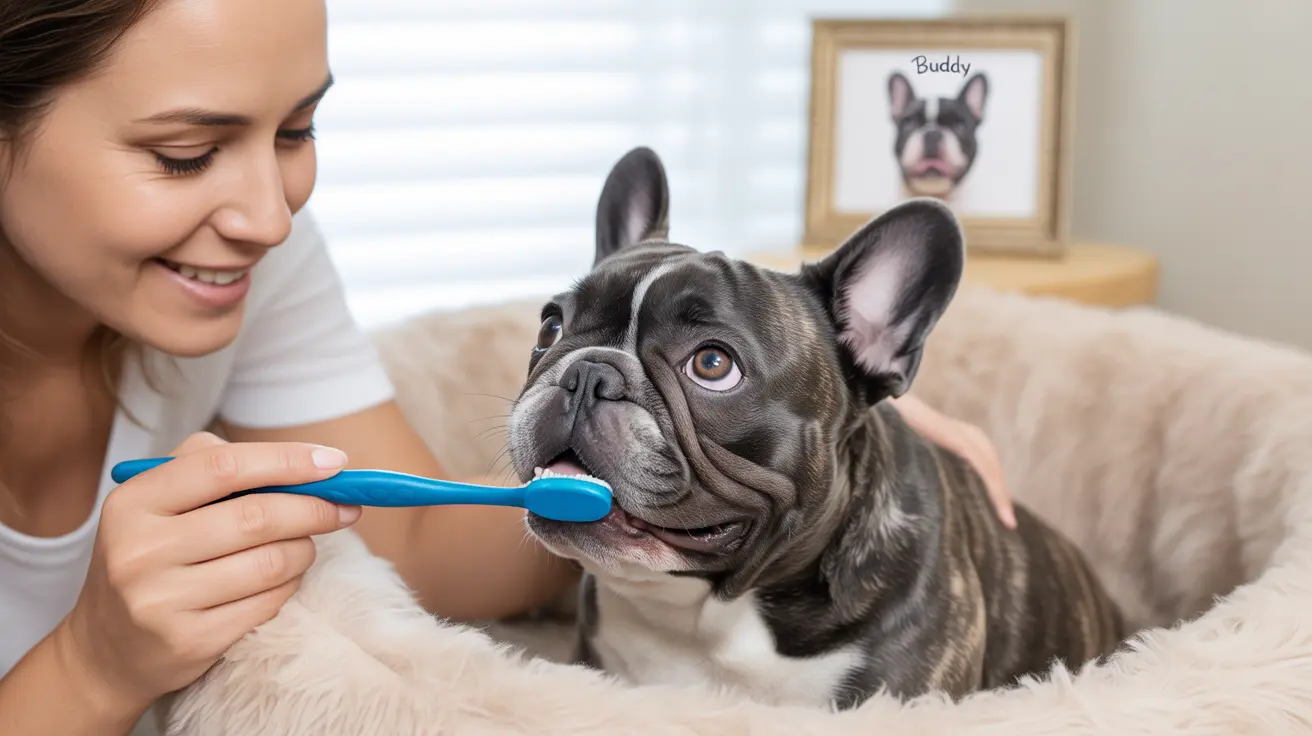Understanding French Bulldog Dental Anatomy
French Bulldogs' brachycephalic (flat-faced) structure creates unique dental challenges. Their shortened jaw must accommodate the same number of teeth as other breeds, leading to overcrowding and misalignment. This anatomical quirk makes them more susceptible to various dental issues and requires special attention to oral hygiene.
Common Dental Issues in French Bulldogs
Overcrowding and Malocclusion
The compressed jaw structure of French Bulldogs often results in overcrowded teeth, leading to difficulties in cleaning and increased risk of bacterial buildup. Malocclusion, particularly underbite, is common and can cause abnormal wear patterns on teeth and potential soft tissue injury.
Periodontal Disease
French Bulldogs are particularly prone to periodontal disease, which begins with plaque accumulation and can progress to severe gum inflammation, bone loss, and tooth loss. Without proper care, this condition can affect not only oral health but also vital organs through bacterial spread.
Prevention and Daily Care
Brushing Techniques
Daily tooth brushing is essential for preventing dental problems in French Bulldogs. Use a soft-bristled pet toothbrush and enzymatic dog toothpaste. Start gradually, making the experience positive through treats and praise. Focus particularly on the gum line where plaque tends to accumulate.
Professional Dental Care
Regular veterinary dental check-ups and professional cleanings are crucial. Most French Bulldogs benefit from annual professional cleanings, though some may need more frequent care based on their individual needs and existing dental conditions.
Signs of Dental Problems
Watch for these warning signs that may indicate dental issues:
- Bad breath (beyond normal dog breath)
- Red, swollen, or bleeding gums
- Difficulty eating or decreased appetite
- Excessive drooling
- Visible tartar buildup
- Loose or missing teeth
Frequently Asked Questions
What are the most common dental problems French Bulldogs face due to their unique jaw structure?
French Bulldogs commonly experience dental overcrowding, periodontal disease, and malocclusion due to their shortened jaw structure. These conditions can lead to plaque buildup, gum disease, and potential tooth loss if not properly managed.
How can I effectively brush my French Bulldog's teeth to prevent tartar and periodontal disease?
Use a soft-bristled dog toothbrush and enzymatic toothpaste designed for pets. Brush daily, focusing on the gum line and outer surfaces of the teeth. Start slowly and make it a positive experience with rewards and praise.
What early signs of dental issues should I watch for in my French Bulldog?
Look for bad breath, red or swollen gums, reluctance to eat hard food, pawing at the mouth, excessive drooling, and visible tartar buildup. Early detection and intervention are crucial for preventing more serious issues.
How often should my French Bulldog have professional dental cleanings to maintain oral health?
Most French Bulldogs benefit from annual professional dental cleanings under anesthesia. However, some may need more frequent cleanings based on their individual dental health and at-home care routine.
Can dental chews and toys really help reduce plaque buildup in French Bulldogs, and which ones are best?
Yes, appropriate dental chews and toys can help reduce plaque buildup, but they should complement, not replace, regular brushing. Choose products specifically designed for small breeds and supervise chewing to prevent choking hazards.
Conclusion
Maintaining good dental health in French Bulldogs requires dedication and consistency. While their unique anatomy presents challenges, a combination of daily home care, professional cleanings, and vigilant monitoring can help prevent serious dental issues and ensure your Frenchie maintains a healthy, happy smile throughout their life.






